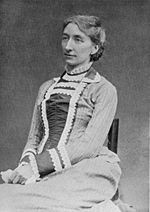Cosima Wagner, Date of Birth, Place of Birth, Date of Death
TweetCosima Wagner
daughter of the Hungarian pianist and composer Franz Liszt
 Date of Birth: 24-Dec-1837
Date of Birth: 24-Dec-1837
 Place of Birth: Bellagio, Lombardy, Italy
Place of Birth: Bellagio, Lombardy, Italy
Date of Death: 01-Apr-1930
Profession: writer, composer, director
Nationality: German Empire
Zodiac Sign: Capricorn 
About Cosima Wagner
- Cosima Wagner (born Francesca Gaetana Cosima Liszt; 24 December 1837 – 1 April 1930) was the illegitimate daughter of the Hungarian pianist and composer Franz Liszt and Marie d'Agoult.
- She became the second wife of the German composer Richard Wagner, and with him founded the Bayreuth Festival as a showcase for his stage works; after his death she devoted the rest of her life to the promotion of his music and philosophy.
- Commentators have recognised Cosima as the principal inspiration for Wagner's later works, particularly Parsifal. In 1857, after a childhood largely spent under the care of her grandmother and with governesses, Cosima married the conductor Hans von Bülow.
- Although the marriage produced two children, it was largely a loveless union, and in 1863 Cosima began a relationship with Wagner, who was 24 years her senior.
- She married him in 1870; after his death in 1883 she directed the Bayreuth Festival for more than 20 years, increasing its repertoire to form the Bayreuth canon of ten operas and establishing the festival as a major event in the world of musical theatre. During her directorship, Cosima opposed theatrical innovations and adhered closely to Wagner's original productions of his works, an approach continued by her successors long after her retirement in 1907.
- She shared Wagner's convictions of German cultural and racial superiority, and under her influence, Bayreuth became increasingly identified with antisemitism.
- This was a defining aspect of Bayreuth for decades, into the Nazi era which closely followed her death in 1930.
- Thus, although she is widely perceived as the saviour of the festival, her legacy remains controversial.
Read more at Wikipedia
See Also
- Famous People's Birthdays on 24 December, Italy
- Famous People's Birthdays in December, Italy
- Famous People's Birthdays on 24 December, German Empire
- Famous People's Birthdays in December, German Empire
- Famous writer's Birthdays on 24 December, Italy
- Famous writer's Birthdays in December, Italy
- Famous composer's Birthdays on 24 December, Italy
- Famous composer's Birthdays in December, Italy
- Famous director's Birthdays on 24 December, Italy
- Famous director's Birthdays in December, Italy
- Famous writer's Birthdays on 24 December, German Empire
- Famous writer's Birthdays in December, German Empire
- Famous composer's Birthdays on 24 December, German Empire
- Famous composer's Birthdays in December, German Empire
- Famous director's Birthdays on 24 December, German Empire
- Famous director's Birthdays in December, German Empire

